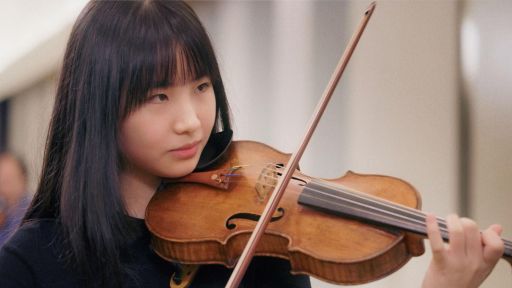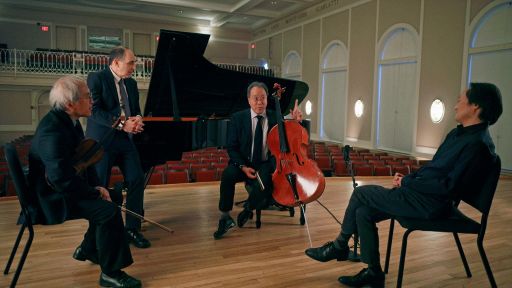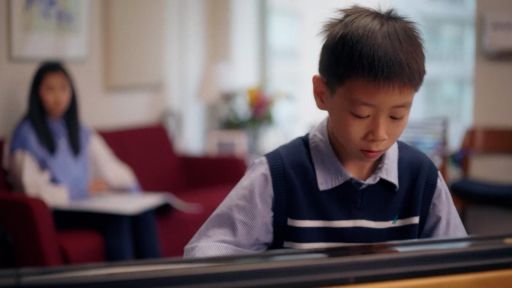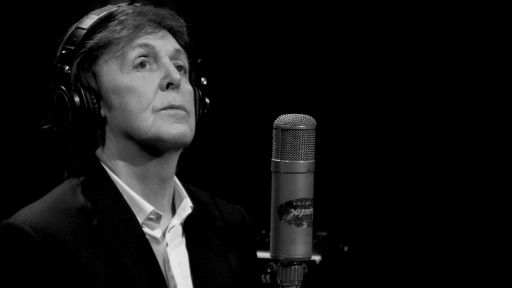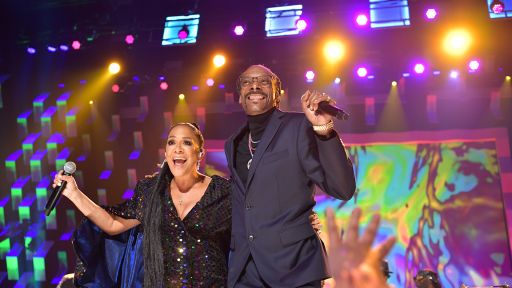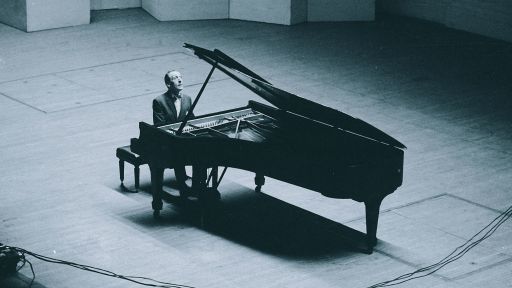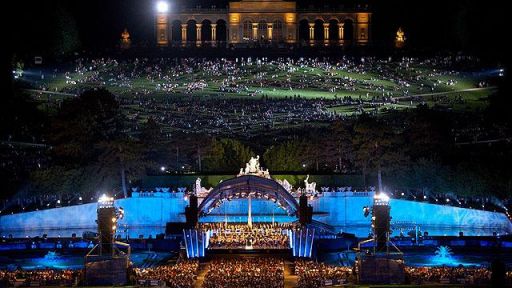TRANSCRIPT
♪♪ -Up next on "Great Performances"...
I'm Scott Yoo.
Come with me to New York City and halfway around the globe to Singapore...
This is Singapore... -Yes.
...on a table.
...to meet some of the greatest young musicians in the world today.
How have they gotten to where they are now?
-Happy with that?
-Yeah.
-Okay.
-What practice is required?
Are you a careful practicer, Wilson?
That is the talent -- the art of practicing.
-Yeah.
-What teaching... -We're thinking about creating an environment that is serious, but it's also fun.
-You're not very good at harp.
-I'm terrible at it.
-The better you are, the more fun it is.
-Hmm.
♪♪ What parenting... -There are so many parents who make huge sacrifices so that their kids can pursue what they love.
-I mean, this is a huge investment on your part just in time and treasure.
And how will these students transition to a professional career?
-These kids are really working to get to where they're at.
♪♪ -I'll look for answers to these questions and more, up next on "Great Performances," as I meet rising stars.
♪♪ Major funding for "Great Performances" is provided by... ...and by contributions to your PBS station from viewers like you.
Thank you.
-My wife Alice and I were visiting my mom in Connecticut.
-All right, here's the ginger.
-All right.
-Mom, when was the first time you made gyoza?
-Oh.
[ Laughing ] 80 years.
Not 80, 75.
-[ Laughs ] 75?
-Yeah.
-Oh.
-This time Alice asked her to bring out the scrapbook.
-Aw!
That's cute.
-This is Scott, definitely.
-That one?
Aw!
-Next day.
-So cute!
You look so studious, honey.
Actually, you look a little annoyed.
-Annoyed?
-[ Laughing ] Look!
-Yeah, he did not want to be in the picture.
-Okay.
-What about this article, Mom?
-Oh, that's the thing.
-Which thing?
-When he did the Boston Symphony.
-Oh, okay.
-Yeah.
I think that guy's name is Harry, right?
-Yeah.
Harry Ellis Dickson.
-You're, like, taking a nap.
[ Mom and Alice laugh ] -That's in the green room of Symphony Hall.
-Of Boston Symphony?
-Yeah.
Mm.
Looks good.
-That looks perfect.
-Yeah.
[ Mom laughs ] You want to start eating?
Good.
-I should have some chopsticks, but... Ooh-hoo!
Hoo!
Mm.
Here it says, "'The BSO competition has been my major competition so far,'" he says.
"It proves that I'm pretty good.
Not good, but pretty good."
[ Laughs ] Wow.
"Scott Yoo doesn't like the word 'prodigy.'"
"'It's just that I don't understand what the definition is,'" he says.
"To me, it's not yes or no.
It's not a binary digit.
It's not 1 or 0."
That is very much you.
-Yeah.
-Oh, it continues.
"'I don't believe in miracles,'" Markov said from his home last week.
"But he is a talented and smart boy.
I feel he can make a very, very brilliant career.
Nobody can predict his destiny, of course, but he has the gifts."
-What exactly are the gifts?
When I was a kid, I didn't think much about it.
I just did it.
Practice.
Perform.
Repeat.
But looking back, I've been wondering, "What does it take for a talented kid to become a top player, prepare to transition to a professional career, especially today?"
So, I decided to take a look, and I'd start in Singapore.
♪♪ ♪♪ Singapore is a mix of the traditional, like bird-singing clubs... ♪♪ ...and colonial buildings from the British time here... ...merged with the modern world of high finance.
I'd never been here before.
And, as usual, I like to get to know a place through my stomach.
So, I went to eat Peranakan food, a cuisine shaped by all the cultures that have traded and settled here -- Chinese, Malaysian, and Indian.
Leon, what is this here?
This, this -- -Chicken.
-It's chicken.
Really?
Okay.
-Ayam buah keluak?
-Yes.
-Yes.
This nut in actual effect, when you eat it raw, it's actually quite poisonous.
-Oh!
Okay.
-Yes.
-Well, you've cooked it down, right?
-It's edible now.
-Okay, all right.
Great.
Can I just serve you guys?
-Oh, yeah.
Yeah.
Of course.
Thank you.
-With me were Leon Chia and Hans Sorensen, two leaders of the Singapore Symphony.
So, Leon, you are native Singaporean.
-Yes, I am.
-By the way, I think this is spectacular.
-Yeah, it's a favorite.
-This is amazing.
So, none of these regions have a really long tradition of symphonic music.
-Singapore is a young country, and the orchestra is even younger, 44 years old now.
And we even have a young audience coming in for the concerts.
They have an average age of 36.
I believe -- -That's pretty young.
-Yeah, I believe actually it's the youngest in the world.
-And then you have a young artist in residence.
-Yes.
And let me show you something.
-Okay.
-I'm going to show you what started this all, when she won the Menuhin Competition in 2018 at age 11.
-Okay.
Ah, yes, I know this video.
[ Classical music playing ] ♪♪ ♪♪ Look at the smile on the cellist's face.
He's having such a good time.
♪♪ ♪♪ You know, it's easy to forget that this is not just a public performance in front of an orchestra of adults, and she's probably never played this with the orchestra before.
This is the finals of a competition.
She's leading the orchestra really well.
-Look how mature she is.
♪♪ -And here she goes.
♪♪ ♪♪ ♪♪ ♪♪ ♪♪ ♪♪ [ Cheers and applause ] Then she turns back into a 11-year-old girl.
That's so sweet.
That's one of my favorite music videos of all time.
-She's really unique for us Singaporeans.
She is very much a national treasure.
-Chloe Chua is now 16 and one of the most promising young musicians in the world.
Today at Singapore's Victoria Hall, she's rehearsing for a Mozart violin concerto recording with the Singapore Symphony and the eminent conductor Hans Graf.
♪♪ ♪♪ With us was Chloe's mom, Eng Lee, who still attends every lesson, every rehearsal, every performance.
♪♪ ♪♪ -Can you -- can you have a little comma before the sixth?
Not... [ Humming ] And position the note with the oboes.
One... ♪♪ ♪♪ ♪♪ ♪♪ ♪♪ ♪♪ ♪♪ ♪♪ ♪♪ Chloe, look, there's...
There's this spot, which in the exposition, you do an echo here.
-Mm-hmm.
-What was the idea here?
-I think the crescendo, then crescendo.
Do a follow -- -A crescendo, then crescendo.
So, yeah.
86, diminuendo.
87, crescendo.
Start it from 81, 181.
♪♪ -Remember that Chloe's in front of a professional orchestra, collaborating with a legend of the industry.
That's a lot of pressure for a 10th grader.
♪♪ -Happy with that?
-Yeah.
-Okay.
-Chloe's just starting her transition to a professional career.
In New York, I went to visit Hung-Kuan Chen, who helped me make that same leap.
He was my coach and accompanist for my Kennedy Center debut.
It's awesome.
You know, when I was preparing to come here, I was checking my diary, and I realized the last time we really saw each other was 31 years ago.
-My God.
-I mean, we're old.
You know, you helped me so much.
I mean, you know, I was just a, you know, talented teenager, and you made me think about music in a different way, like an adult.
And you made me into a musician rather than just a violin player.
I never thanked you for that, so... -Oh, my God.
-...thank you.
-I never realized that.
It was just out of pleasure and also curiosity and interest because, you know, you were so brilliant.
-Do you want to play the Brahms Sonata for old times' sake, 32 years later?
I haven't played it since.
-Really?
-Yeah.
You want to try it?
-Okay.
-Okay.
♪♪ ♪♪ ♪♪ ♪♪ ♪♪ ♪♪ ♪♪ ♪♪ ♪♪ What an amazing piece of music.
-It is.
-Every time it's better.
-Like an old wine.
-It's like a symphony for two people.
It's incredible.
Anyway, what an honor to play with you, Hung-Kuan, really.
-Ah!
-Amazing.
-My luck or my privilege, I should say, that I play this music and with you.
-So, you teach at Juilliard Pre-College?
-Yes, I do.
-So, that's very different from teaching the college kids, right?
-It is.
It's different age group and a different emphasis.
You watch them going through their adolescence.
-So, that's hard, right?
-I wouldn't say it's hard, but it's very interesting.
-So, do you have any really young students right now at Pre-College?
-Oh, yes.
Yes.
I have this young boy.
His name is Wilson Liu.
He's only about this tall, and he has small hands.
Can't play an octave yet, and he can't reach the pedal yet.
But he's remarkable.
-Really?
-Yes.
-Can I meet him?
-Absolutely.
-Thirty-five years ago, I attended Juilliard Pre-College, and I wanted to go back to meet some of their star students and the program's director, Weston Sprott.
So, Weston, how many of the families here are families that moved here just for Pre-College?
-About 20%.
-That is insane.
-Yeah, so, you consider this as just a Saturday program and that there are families who move from literally across the world so their students can be here.
It is an amazing commitment and sacrifice that they're making to this artistic education.
-How many weeks is this?
Thirty weeks?
-Thirty weeks a year.
-So, they're moving their entire family here for 30 days of instruction?
-That's correct.
-I mean, that is astounding.
-It is.
But it happens every year.
-Wow.
And so, when a parent entrusts their child to you, what are you at Juilliard doing to help them?
-We're thinking about creating an environment that has rigor, that is serious, but it's also fun.
You know, when you're young, you want to be able to learn through joy.
Actually, that's something we should all aspire to, even as adults.
One of the greatest things we could possibly do is have the maturity and the technical ability of someone who's 30 or 40 years old with the enthusiasm of someone who's 16.
-Yeah.
-So, we try to find a really, really healthy balance of those two things.
-But that's where the rubber meets the road, right?
I mean, they've got to play their scales, and they've got to have a good time playing, you know, Brahms or whatever.
-As I tell my students oftentimes, the better you are, the more fun it is.
-Mm.
♪♪ ♪♪ I dropped into the lesson of Olivia Shidler, hoping to see how the Juilliard of today combines rigor and fun.
♪♪ [ Applause ] Bravo, Olivia.
-Thank you.
-You sound fantastic.
-Thank you so much.
-So, of course, you're studying with the most famous harpist in the world here.
But I see a lot of, like, pinching.
And I imagine that's when you're playing a harmonic.
-Yes.
You kind of tuck in your index finger here, and you put your thumb up way high and go like that.
-So, Nancy, how do you teach a protégé to do that?
Because it's hard, right?
You've got to be right in the middle of the string.
-Right in the middle of the string, and, believe it or not, a lot of my colleagues in the orchestra, percussionists come up, and they want to learn how to play harmonics on the harp.
Everybody wants to know because it's such a different and a beautiful technique.
-It's hard!
It's incredible.
And so, can I just actually just try moving a pedal on that?
-Yeah, sure.
-I've never done this before.
-Sit down.
-Okay.
So I sit down.
This is a "C." -The harp goes on your shoulder.
-Oh, it does?
Okay.
-Mm-hmm.
-So, this is a "C." This is a "C." And then which pedal does the "C"?
-Well, it's this one right here.
-It's this one?
-Yeah.
-So, now I'm playing a C-sharp, and now I'm playing a C-natural.
I'm playing a C-natural.
And this is the bass.
This is a C-flat.
-Yeah.
-I just played the harp.
-So now play the C-sharp.
-Can I do a harmonic?
-Give it a try.
-Okay, so wait.
How do I do it?
You go like this?
-Go like this.
-Okay.
-No, you're going to actually use this finger.
Stick it down.
Thumbs up and you want to... -Yeah, and the index finger kind of goes like this.
And then just pluck.
-And pluck like your... Oh, my God.
Hard, hard.
Press hard.
-Ow!
-You're not very good at this.
-I'm terrible at it.
But that's it, right?
-Yeah, that's the position.
-Yeah.
There you go.
So, that's the way a violinist would do it.
Yeah, exactly.
We also have other ones way up here.
-Oh, you do it like the real crazy ones.
-We don't often do that.
-Can you show me that on the harp?
Like, a crazy one?
-Like, so... -Wow!
Wow.
-That was luck that I got it.
-No, it's not.
That's because you're Nancy Allen.
That's why.
-We don't do that very often, but it's interesting.
-Wow!
Do you want to play something else for us?
-Sure.
-All right.
♪♪ ♪♪ ♪♪ ♪♪ ♪♪ Back in Singapore, to get to know Chloe, I asked her to take me to a favorite spot.
♪♪ ♪♪ ♪♪ ♪♪ ♪♪ ♪♪ ♪♪ ♪♪ ♪♪ Pfft!
I haven't made a basket yet.
♪♪ ♪♪ Now that we'd had Chloe's favorite food, Eng Lee wanted me to try one of hers, durian.
Some love it.
Some find it repulsive.
There was a famous restaurant critic who said that this smells like pig poop... -Oh!
-...rotten onion... -Oh!
-...turpentine... -Wow!
-...with on top old socks.
-Oh, no!
-So you like eating this, right?
-Yeah, I do, yes.
And, Chloe, you don't like eating this, right?
Okay.
I'm a little scared.
I'd like to try it.
Can you pick a really good one for us?
One that's really ripe?
-Yeah.
-Huh.
-Oh!
Oh!
Yeah.
Nice color.
-Oh, it smells not so bad.
Try it.
What's that smell like to you, Chloe?
-It smells like green avocados.
-Green avocados?
Let me smell.
Ah!
Okay.
This doesn't smell like something that's sweet to me, but this doesn't smell so bad, actually.
I'm not as afraid.
-Okay.
-Let's try it.
-Yeah.
That's right.
-Scott, I think we need to use the gloves... -Okay.
-...because when you're eating the durian, you leave the durian scent off of it on your fingers.
-It smells?
-Yeah, it'll smell.
-Really?
-Yeah.
-All right.
Wow.
It just keeps coming.
-Yeah.
-There's more and more and more.
Chloe, I think I'm going to watch you eat this first.
-You have to eat, too.
-No, I'll eat it, but you got to go first.
-I'll eat a bit, and you eat a bit.
-Okay.
You got a deal.
-How do you like it?
-Okay.
It's not terrible.
Is it good?
Is this a good... -Yeah, not bad.
Mm.
-So, I know you don't like this, but is this a traumatic experience for you, or you don't mind it so much?
-It's not traumatic, but I just don't like the taste.
-Yeah.
-So, you guys disagree on this.
-Majorly.
-Majorly.
Do you disagree on a lot of things, or only this one?
-Yeah, yeah.
-I mean, you guys seem like you're very close.
-Yes, we are.
-Yeah?
So, Chloe, you're 16 now, right?
-Yeah.
-So, when I was your age, I was getting into a lot of trouble because I had a kind of rebellious phase.
But it seems like you haven't had that rebellious phase yet.
-I'm not sure, but even if it comes, I'll try to keep it under control.
-Okay!
[ Laughter ] -Yeah, we sometimes do have disagreements.
-Yeah.
-Yeah.
-But I think I will have to try to understand her situation, because it's not easy to keep repeating something and to get perfection.
-Sure.
-So, I try to understand.
-Well, it seems like you've gotten there.
-[ Laughs ] -Pretty close.
-Yeah.
-Yeah.
-At Juilliard, Weston wanted me to meet a star pupil, 11-year-old Bode Nickerson.
♪♪ ♪♪ ♪♪ ♪♪ ♪♪ ♪♪ Bravo.
-Thank you.
-Really good.
-Great job, great job.
Can we go back to the beginning of this?
And something I want you to think about is making that first note come in really centered and strong right away.
I'll show you.
Josh, can you give us a start?
Does that make sense?
-Yeah, okay.
-Give that a try.
♪♪ That's great.
That's great.
That's exactly right.
And now the second thing I want you to think about right after that is the rhythm because you have this triplet over two beats, right?
In the second bar?
I'll be the human metronome for a second just so you can feel it.
And then we'll come back, and we'll eliminate it, okay?
So, here we go.
One and two and three.
♪♪ That was exactly right.
Now do it without me.
♪♪ Yeah.
Much better, much better.
-It kind of helps when you have one of the best trombonists around playing right next to you, right, Bode?
-Yes.
-And you kind of rise to the occasion -- right?
-- when you hear that.
-Yes.
-And then you just get better and better with each volley, right?
-Yeah, definitely.
-So, we try to do that as much as we can because it keeps the feedback loop really tight, and it keeps the learning happening constantly.
-Well, you can see it in your teaching, Weston.
It's very interesting.
So you're from Great Barrington.
-That's right.
-At the end of the Mass Pike.
-And that's right.
It takes us about 2 hours and 45 minutes to get here one way.
So, we decided we had to get a place here so we could come down on Friday evenings.
-I mean, this is a huge investment on your part, just in time and treasure for essentially 30 days at Juilliard.
-Right, 30 lessons a year.
That's right.
-I mean, 30 lessons and everything else that Juilliard provides, right?
He gets all these colleagues -- right?
-- who are his age.
Peers.
-Right.
Yes.
He's found his people here.
-Yeah.
-And I think that's really hard to replicate in any other setting.
He's found a passion.
He loves it.
And he's at a place that can support him.
And, you know, as a parent, I'll really try to do my very best to help him along the way.
And sometimes, you know, he falls down, and I have to help him get back up again.
But that's an important lesson that he learns, to do something at a high level and challenge himself.
And I think the discipline he's learning in this program is something that will carry him through, you know, for the rest of his life, no matter what field he chooses.
-Well, it's an incredible amount of dedication for the students and the parents.
I mean, I lived that myself.
-Absolutely.
There's so much commitment that's required from their families.
I tell this to our students.
Every time you play, you are thanking your parents.
-Further uptown, I went to see Peter Dugan, the host of "From the Top," the popular NPR radio show that features top young musicians from across the country.
You know, we were flipping through a scrapbook a couple of days ago, and there was a little headline that said, "Scott Yoo: Prodigy."
I don't remember exactly what it said.
-Yeah.
-And, you know, I realized that people don't really use that term very much anymore.
-We actually ask the young musicians who come on "From the Top," "How do you feel about hearing the word 'prodigy'?
Do you like to be called a prodigy?"
And 100% of the time they say no.
-100%?
-Yeah.
-The term can make them feel like they're, you know, a circus act or someone who's just there to be put on a pedestal and entertain.
But also it can diminish the hard work that goes in to getting to the level that they're at, right?
It's not just some sprinkle of fairy dust and boom, "You're a prodigy now."
No, these kids are really working to get to where they're at.
-At least in my case, my father was in the room with me every day, practicing two, three, four hours.
Tell me about the parents that you meet.
I mean, you must meet dozens, scores and scores of parents every week.
-We see all kinds of parents and the relationships between young musicians and their parents.
We see it all.
We had someone recently who said that they and their mom are like the Gilmore Girls.
We've had another kid who came on the show and told us he had been struggling with mental health and revealed some things that he said he had never talked to his parents about before because they just didn't have that kind of openness with each other.
So, we have kids whose parents are professional musicians, and the kids tell us stories about practicing with the parents in the room.
-A friend of mine and I were standing at the back of a concert hall listening to a particularly young player play just beautifully.
And I whispered to him and said, you know, "I heard that person practicing, and it was really high-quality practicing."
And he said, "That's what talent is.
That is the talent is the art of practicing."
It's almost like that is the most important talent to have.
Can you teach yourself?
I don't... -You have to know yourself in the practice room, but I think it's about finding a balance between discipline and structure and creativity in play.
♪♪ -At Juilliard, I finally got the chance to meet Hung-Kuan's youngest student, Wilson Liu.
♪♪ ♪♪ ♪♪ ♪♪ ♪♪ ♪♪ ♪♪ ♪♪ ♪♪ ♪♪ Beautiful.
-Thank you.
-Prokofiev?
-Yeah.
-I think he wrote this when he was a student.
-Just like me.
-Just like you.
And he wasn't much older than you were when he wrote it.
-Wow.
-Yeah.
How long have you been playing that?
-A couple months.
-A couple of months?
-Yeah.
-How did you get that all in your head?
It's pretty good.
-Thank you.
-What's your favorite composer?
-I mean, at first I loved Chopin, but I can't play it, obviously, since... -Not yet.
-...I have little hands, wouldn't you say?
So, I can't play any Chopin.
But I love Beethoven, Bach, Mozart.
-They were pretty good.
-You know what?
Everything.
-Yeah, everything.
So, how much do you practice a day, Wilson?
-Averagely 2 to 3 hours, since there's school and stuff.
And on the weekends, more.
-Like 4 or 5?
-Maybe.
-Wow.
That's a lot of time.
-Yeah.
I mean... -So, you don't mind practicing?
-No.
-You like practicing?
-Yeah.
-Are you a careful practicer, Wilson?
-Depends on if I can actually play it good or not.
So, if I have to practice, like, to make it better, so I would have to practice slowly in order to get, like, the details in.
-Sure.
-Yeah.
-Yeah, you know, they say that practicing slow, slow is fast.
-Yeah.
Makes sense.
-In Singapore again, I wanted to know about Chloe's practice routine.
So, Chloe, how much do you practice every day, if I may ask that personal question?
-It actually depends on that day because if I'm less free, I'll practice less.
But if I'm free for the whole day, I'll practice, like, 5 to 6 hours.
-Okay, so you're a big practicer.
-Yeah.
Sort of.
-So, what do you do in a practice session?
-I start off with the open string like this.
Yeah?
And then after that, the double string.
-Oh, that's a good idea because it's hard.
-Yeah, it is.
-Okay.
-After that, the finger exercise.
-Okay.
Yeah.
-Then do the same thing, but it's separated.
-Nice.
Nice.
Okay.
-Then skills.
-Mm-hmm.
-And I might do, like, études or, like, caprices before I -- -Like Paganini.
-Yeah.
-Okay.
Those are very hard.
-Yeah.
-I saw you once on TwoSet Violin.
Tell me about what that was like.
-It was so fun, actually, because once they say, "Cut," I'm just there laughing, you know?
-That's awesome.
-It is.
-What did you do for them, like, on their show?
-I did the Ling Ling workout.
So, basically, Ling Ling is like a fictional character that plays the violin perfectly with no mistakes at all.
And it's 100% accurate, and everything is just there.
-Okay, so what kind of exercises did they make you do?
-It's like invert the bow and play, like, for example, Bruch 3rd movement.
♪♪ -Oh, my God.
Let's see if I can do that.
♪♪ Well, it's really hard.
It feels wrong.
-Because the weight is, like, at the top.
-Yeah.
-Yeah.
-Okay.
And then what else?
-And then the crazy one is invert the violin to this hand and the bow on that hand.
-So, play backwards?
-Opposite.
Yeah.
-Okay.
Let's see if we can do that.
Oh, my God.
It's totally ridiculous.
What do you want to play?
-"Twinkle."
-"Twinkle."
All right.
Start on "A"?
-Yeah.
-All right.
Ready?
♪♪ [ Violins screeching ] ♪♪ Well, that's, uh, that's really, really awful.
-Yeah.
[ Laughs ] -Okay, here's a pop quiz for you.
-Okay.
-So, I know you're working on Mozart 3 because you're recording it.
-Yeah.
-But you've also recorded Mozart 5, right?
-Yeah.
Last year.
-Okay.
So, I'm going to be the orchestra for you, but I'm going to be terrible, okay?
Because what this is a test of is not whether you can play the Mozart violin concerto.
It's a test of how well you know the orchestra part.
-Yeah.
-So, let's go.
Just start with allegro aperto.
♪♪ [ Scott slows tempo, begins humming ] ♪♪ [ Scott quickens tempo ] ♪♪ ♪♪ ♪♪ ♪♪ ♪♪ Well, bravo.
You played nearly flawlessly, and I played in the wrong key, and I rushed and I dragged.
So, you pass.
-Thank you.
-Congratulations.
-Thank you.
[ Horn honks ] You know, Peter, I've been listening to a whole bunch of young kids.
-Yeah.
-And as I've been listening to them, it's reminded me that so many of the composers that we love were also kids.
-Yeah.
-I mean, you think about somebody like Mozart or somebody like Mendelssohn.
That's the -- -Ooh, now we're talking.
I mean, as impressive as Mozart was when he was 16, you can argue that what Mendelssohn did when he was 16 is better than anyone else at that age in any discipline.
-Yeah.
-I mean, just like the octet.
♪♪ -Yes.
-I mean, at any age... -Right.
-...who surpassed that work?
At any age.
-At any age.
I don't know.
-Nobody.
-It's one of the greatest chamber pieces written ever.
And the other thing that's interesting to me, when you look at all these young composers, is when do they start to sound like themselves?
You know, I think of someone like Debussy.
When he was 18, he wrote this piano trio.
Have you ever played it?
-I've heard of it.
I've never done it.
-It doesn't get played very often, partly because it doesn't really sound like Debussy the way we think of it.
♪♪ It's so lyrical and melodic.
♪♪ You know, it's beautiful, even though it doesn't quite sound like Debussy yet.
-Sounds like Saint-Saens.
-Yeah, or even Franck, who was his teacher at the time.
Then, on the other hand, you have someone like Chopin, who wrote his very first nocturne when he was 16 or 17 years old, and, to me, this already sounds like Chopin.
♪♪ ♪♪ The depth is there.
You know, the soul is there.
-Where did he get that?
Because that's the regret of an old man.
-I know.
I know.
Well, I think -- -Was he pulling that from some other composer?
I mean, how did he get that?
-Well, we know that he heard of nocturnes before from the Irish composer John Field.
But then, of course, Chopin totally reinvented the genre already as a teenager.
But as far as the Chopin sound goes, you know, he was in Poland.
He was inspired by the Polish music, you know, that he was hearing around him.
And so, I think especially before the days of YouTube and Apple Music and recorded music, composers were so influenced by the immediate world around them, and that started to seep into their sound already at this very early age.
-I mean, Peter, you see kids on a daily basis.
Like, what's happening?
Is it something in their water?
-Every young composer who comes on "From the Top" has their own kind of process.
We've had someone recently who told us that they come up with tunes just walking down the street.
They hear something in their head, they pull out their phone, and they actually make voice memos just singing.
But then we have others who just sit down and they play a few notes on their instrument, and they experiment until they like something, the way it sounds.
It's basically improvisation, you know?
-Well, if you think about it, Mozart was a great pianist.
Rachmaninoff might have been the greatest pianist ever.
Chopin was one of the greatest pianists ever.
Maybe it helps to be a good player.
-Certainly helps.
And I think we're seeing that now with young musicians today even more.
I think it's starting to come back.
With great young players, more of them are getting into expressing themselves, their own voice through improvisation and through writing music.
-Speaking of wildly talented young composers, I got a chance to meet one.
"Year 1 Jury," Isaac Thomas.
This looks like the phone book in my town.
This is all your composition, huh?
-Yeah.
-Crazy.
-This is beautiful.
I teach in a pre-college composition program, and Isaac brought in this wonderful tome of all of the music that he wrote this year.
I mean, look at the table of contents, tabs.
Just the cover to this alone is amazing.
As a composer, I am envious of these skills.
-That piece -- can we give that a try?
-Fine.
-Yeah?
All right, let's do it.
Now, before we start, you have here, you have these "X's."
What does that mean?
-It just means to be very kind of choppy and harsh and... [ Playing choppily ] -Like that kind of thing?
-Yeah.
-Oh, good.
That comes very naturally to me.
So, that's good.
What about, um, here you have written "ponticello," this little, fast, galloping thing.
[ Playing quickly ] Is that how you want it?
-Oh, no.
That's separate.
So, it's a bit more kind of like silvery, a bit more blunt.
♪♪ -Is that better?
-Yeah.
-Okay.
What about here?
♪♪ Is that how you want it, or you want it a little different?
-Well, no, I think I meant more like... ♪♪ -A little smoother?
-Yeah, a bit more like legato.
-Legato?
Okay.
-Gentler.
-Let me try it.
Is that more of what you want?
-Yeah.
-You know, I'm really honored that you wrote this piece for us.
-Of course.
-This is incredible.
How long did it take you to write this?
-I wrote it over the two past nights.
-So, you wrote this in two days?
-Yes.
It's actually easy if you have the ideas, like, there, like, still in your head as you're writing it because I feel like it's harder to write pieces over, like, say, six months or, like, nine months because you don't remember what you've composed.
-Really?
Interesting.
-So, this is kind of very fresh in my mind, so I can understand how I wrote it and why I want this and why I want that.
-Should we give this thing a try?
-All right.
-All right, I'm excited.
From what I can tell, this is a really good piece, Isaac.
I mean, I don't care if you're 11 or, you know, 137.
I mean, this is a real accomplishment.
So, really wonderful.
-Thank you so much.
-Wonderful.
Let's try it.
♪♪ ♪♪ ♪♪ ♪♪ ♪♪ ♪♪ ♪♪ So, how are you going to guide Wilson from being a 9-year-old student to having a career as a pianist?
-I am more focused on their own development.
Music has to come through them and to be authentic.
I'm going to see how he will blossom on his own, and I will help him growing into his own authentic self.
-Wilson, have you ever played a violin-and-piano sonata before?
-No.
-I mean, have you ever played anything with anybody?
-No, never.
-So, this is going to be the first time.
-Yes.
-So, this piece that we're going to play, and thank you for learning it, it's the first piece of music I ever played in public.
And I was your age.
I was 9.
And Mozart was 22 when he wrote this.
And even though he had written many pieces before that, he called it his opus one.
Like, it was almost like his transition into adult composing.
You want to give it a try?
-Yeah.
-Okay, let's do it.
♪♪ ♪♪ ♪♪ Hung-Kuan's most famous alum is Yuja Wang, probably the most celebrated pianist in the world today.
He told me that Wilson shows the same spectacular talents that she did at his age.
♪♪ ♪♪ ♪♪ ♪♪ ♪♪ ♪♪ It's a long way from here to the concert stage, but we may be looking at the next international piano sensation.
♪♪ ♪♪ So, what now?
What's next for her?
-I think she should go overseas for further studies.
Especially, I think she needs to be in the environment that she is together with other kids that are doing the same thing.
And then maybe she can play string quartet, piano trio, all this.
I think she would love doing, though.
-You know, Chloe is such a good violinist and she's such a sweet girl.
People are going to want to play with her.
And, I mean, she will just explode, being around people like that.
I think that would be very useful for her.
-Yeah, yeah, definitely, definitely.
-Where do you see her in ten years?
Like, what do you want her to be doing or experiencing or feeling or...?
-I hope she could be happy with her life and especially as a violinist.
And I hope that she could still be as passionate as she is now playing with the violin, and also travel around the world to perform and share her music with audiences, like what she's doing now.
-Mm-hmm.
-Yeah.
-It's a beautiful dream.
-Yeah.
-Yeah.
You know, having gone through what Chloe is going through, she's obviously put a lot of hard work into her craft.
But it also takes a lot from the parents.
And so, I really have to compliment you, Eng Lee, because obviously you've done a masterful job, and that's really an amazing act of love.
You know?
-Thank you.
-Eng Lee has piloted every step of Chloe's journey, as have all the parents I've met.
That's certainly a gift of the only thing we really have in life -- time.
Chloe and Hans had one more meeting before the Mozart recording.
So, what do you want to do differently that you've never heard before?
-Some places I'll change my style.
Instead of doing a legato bow, I might change it to, like, a separate bow.
Those small difference, that makes it.
-The details are important, aren't they?
This middle section obviously is so different from the rest of the third movement.
What are you thinking here?
-Maybe I'll do it like a soft dance.
Like, it's not too loud, but it's very elegant at the same time.
-This is like a little bit of dusty, old music.
Very charming.
-Written by a 19-year-old.
-Yeah, yeah, yeah, yeah, who had no real-life experience of baroque music.
And then he sees that's not really what we want, and he stops it and says, "I propose something different, and you will have fun."
-Well, should we try it?
-Sure.
-Okay.
♪♪ ♪♪ ♪♪ ♪♪ ♪♪ ♪♪ ♪♪ ♪♪ So, what exactly are the gifts?
Talent on the instrument is just one, but also a talent for practice... Parents who are completely committed... ♪♪ Teachers and mentors with great talent of their own... ♪♪ Add years of hard work and dedication from all of them... ♪♪ Plus, the good fortune to be born in a time and a place that values music.
♪♪ With all that, a promising student may one day become an artist... ♪♪ ...and if the stars align just right, a virtuoso.
♪♪ But that's something I'll look at in the next episode of "Now Hear This."
♪♪ ♪♪ ♪♪ ♪♪ ♪♪ ♪♪

